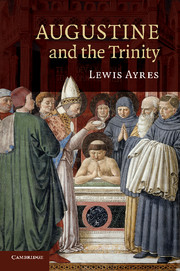Book contents
- Frontmatter
- Contents
- Acknowledgements
- List of abbreviations
- Introduction
- Part I Origins
- Part II Ascent
- Part III Into the mystery
- 7 Recommending the source
- 8 Essence from essence
- 9 Showing and seeing
- 10 Loving and being
- Part IV Memory, intellect and will
- Epilogue: Catching all three
- Bibliography
- Scripture index
- General index
- References
9 - Showing and seeing
Published online by Cambridge University Press: 06 December 2010
- Frontmatter
- Contents
- Acknowledgements
- List of abbreviations
- Introduction
- Part I Origins
- Part II Ascent
- Part III Into the mystery
- 7 Recommending the source
- 8 Essence from essence
- 9 Showing and seeing
- 10 Loving and being
- Part IV Memory, intellect and will
- Epilogue: Catching all three
- Bibliography
- Scripture index
- General index
- References
Summary
From the argument so far we can draw out three key principles of Augustine's Trinitarian ontology. First, in God there is nothing accidental. Second, each of the divine three is irreducible and the fullness of God, even as the divine three are together the fullness of God. Third, the Father eternally gives rise to the Son and the Spirit from his own substance or essence such that there is a communion of co-equals. Throughout his articulation of these principles Augustine is radical in rejecting the metaphysical usefulness of genus and species terminologies, and largely reliant on a small set of principles concerning the divine simplicity. Augustine is also, I suggested, highly tentative and austere in what he says about a fourth principle which will be the focus of discussion in this chapter and the next: the principle that each of the divine three may be understood as identical with the intra-divine acts that Scripture attributes to them. In order to draw out this fourth principle, I will look mostly outside the De trinitate, to the two main contexts in which Augustine does gradually come to express himself far more clearly on this aspect of his Trinitarian ontology. Questions of relative dating here are complex. While the texts considered in Chapter 8 probably date from c.411–15, the texts that will be our main focus in these two chapters stem from the years between 412 and 427.
Information
- Type
- Chapter
- Information
- Augustine and the Trinity , pp. 230 - 250Publisher: Cambridge University PressPrint publication year: 2010
